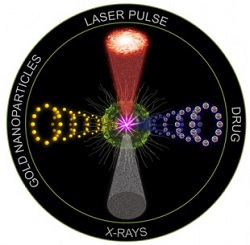 |
| The "quadrapeutics" technique delivers a four-part treatment designed to maximize the efficiency of cancer drugs.--Courtesy of Rice U. |
Like a molecular swiss army knife, a new technique that engineers have dubbed "quadrapeutics" offers a four-in-one cancer treatment to blast tumors into submission, and a preclinical study showed that it was 17 times more effective than traditional chemotherapy.
Working off their previous studies with plasmonic nanobubbles, which explode to blow cancer cells apart, the Rice University team used a mechanical method to amplify the dose of chemotherapy that reaches cancer cells in the body, leaving healthy cells nearby unaffected.
It comprises four components, according to a report from the university. First, there is a low dose of a chemotherapy drug, for which the researchers used doxorubicin and paclitaxel. Encapsulated and tagged with antibodies, these are magnified by the explosive action of the nanobubbles when delivered in small doses.
The second part uses gold nanoparticles, which cluster inside cancer cells and are activated by the third component, a near infrared laser pulse delivered with an endoscopic procedure. The gold nanoclusters convert this energy into plasmonic nanobubbles.
Finally, the fourth component is a low dose of radiation that amplifies the effects of the drug at a smaller dose than what is common now.
 |
| Dmitri Lapotko |
"What kills the most resistant cancer cells is the intracellular synergy of these components and the events we trigger in cells," lead author Dmitri Lapotko said in a statement. "This synergy showed a 100-fold amplification of the therapeutic strength of standard chemoradiation in experiments on cancer cell cultures."
In the study published in Nature Medicine, the team showed that the treatment effectively eliminated head and neck squamous cell carcinoma tumors in mice with just 3% of the typical drug dose and 6% of the radiation. Its effect in drug-resistant tumors has been particularly promising, the authors say.
"We address aggressive cancers that cannot be efficiently and safely treated today," Lapotko said. "Quadrapeutics steps up when standard treatments fail. At the same time, quadrapeutics complements current approaches instead of replacing them."
- here's the Rice University report
- and here's the abstract